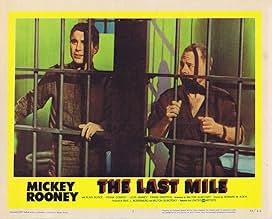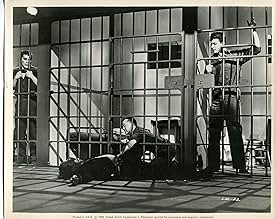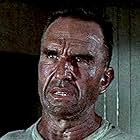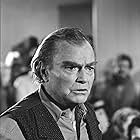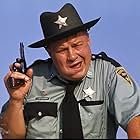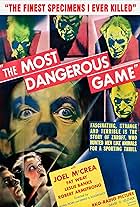A prison break is attempted the same night an execution occurs on death row.A prison break is attempted the same night an execution occurs on death row.A prison break is attempted the same night an execution occurs on death row.
- Director
- Writers
- Stars
Johnny Seven
- Tom D'Amoro
- (as John Seven)
Don 'Red' Barry
- Drake
- (as Donald Barry)
- Director
- Writers
- All cast & crew
- Production, box office & more at IMDbPro
Featured reviews
The movie may be a cheap-jack production, but it also has a number of graphic touches including Rooney's absolutely riveting performance. With its single set, ugly b&w photography, and no-name cast (except for Rooney), I can't imagine the film played more than a few remote drive-in's farthest from town. Nonetheless, the 80-minutes pushes the bounds of 50's movie-making in several notable ways.
For example, catch how much emotional fear the doomed men—whether guards or cons— show when facing death. It's really unusual for that period to risk agitating audiences with realistic fears of death. But this one does. Also, the ricocheting bullets had me ducking under my chair— a really well done special effect. Actually, this cheapo comes closer to Sam Peckinpah's raw depiction of violence than about any film I've seen from that time—bullets actually raise blood, and despite their pleading people do get shot point blank. I'm guessing the producers got away with this because Hollywood didn't much care what a few necking teenagers might use for background.
It's an ugly movie in more ways than one—not a single woman in sight!-- just a bunch of ugly guys. At the same time, the first half too often drags before picking up with the slam-bang second half. Then too, have you ever seen a more barren or squeakier clean cell block, likely a reflection of the story's stage origins. Anyway, it's Rooney at his most intense. And despite the movie's really brutal nature, there are more moments of genuine honesty than in most A-productions of the period. But it's not one you want to see if you're feeling down.
For example, catch how much emotional fear the doomed men—whether guards or cons— show when facing death. It's really unusual for that period to risk agitating audiences with realistic fears of death. But this one does. Also, the ricocheting bullets had me ducking under my chair— a really well done special effect. Actually, this cheapo comes closer to Sam Peckinpah's raw depiction of violence than about any film I've seen from that time—bullets actually raise blood, and despite their pleading people do get shot point blank. I'm guessing the producers got away with this because Hollywood didn't much care what a few necking teenagers might use for background.
It's an ugly movie in more ways than one—not a single woman in sight!-- just a bunch of ugly guys. At the same time, the first half too often drags before picking up with the slam-bang second half. Then too, have you ever seen a more barren or squeakier clean cell block, likely a reflection of the story's stage origins. Anyway, it's Rooney at his most intense. And despite the movie's really brutal nature, there are more moments of genuine honesty than in most A-productions of the period. But it's not one you want to see if you're feeling down.
Clifford Davis is the newest inmate on death row. We get a picture of life on death row, focusing mostly on the terrible waiting, until the systematic abuse by guard "Red" Barry leads to tough-guy inmate Mickey Rooney cracking an instigating a jail break. The last act is an increasingly violent stand-off.
The film is an adaptation of a 1930's play by future blacklisted screenwriter John Wexley. You can see how this could have been intended at one point as an expose (it was adapted as an earlier film in 1932), but this film starts with a title card assuring you that everything you see has already been fixed. What you get here is a very theatrical, violent crime drama. It's not bad, but it's certainly not great either.
It might seem like casting Rooney as a tough guy is far against type, but he played a string of these kinds of roles in the 1950's and early 1960's. He's pretty convincing and really only far exceeds the top in the last few minutes.
The film is an adaptation of a 1930's play by future blacklisted screenwriter John Wexley. You can see how this could have been intended at one point as an expose (it was adapted as an earlier film in 1932), but this film starts with a title card assuring you that everything you see has already been fixed. What you get here is a very theatrical, violent crime drama. It's not bad, but it's certainly not great either.
It might seem like casting Rooney as a tough guy is far against type, but he played a string of these kinds of roles in the 1950's and early 1960's. He's pretty convincing and really only far exceeds the top in the last few minutes.
Having not seen this film in about 20 years I am still impressed with it 's hard -hitting impact and stellar acting. Of course, one Mr. Mickey Rooney is indeed, INCREDIBLE in his role as the ring-leading "Killer".(In reference to another review here-none other than Orson Welles evoked Mickey Rooney's name as the greatest movie actor,also.) I also recall the jazzy-brassy score and the bare black and white photography. I love the Mick's last line before he goes out for his dose of lead poisoning.(I think the Stranglers lifted it for a line in one of their songs-Get a Grip on Yourself.)This is a great film and unjustly buried film. Let's get it out ! Side note-a recent Film Review magazine gave a big write up on Don Segal's "Babyface Nelson" ,made a couple years before "Last Mile" and also starring Mickey Rooney. Another rave of the Mick's intense and sympathetic performance.Perhaps it's the start of a groundswell of a appreciation for some truly superior cinematic performances.
I wouldn't go so far as to say that Mickey Rooney's the whole show in this movie but that wouldn't be far from the mark. This extremely violent 1959 remake of a 1932 film based on a Broadway play by John Wexley is directed in slam-bang style by Howard Koch, who does such a fine job it could just as easily be Don Siegel or Phil Karlson behind the camera. For fans of the prison genre this is a must see. It has it all.
The plot is basic stuff about doomed men in the big house, how they're treated by the guards, what motivates them, how the prison system works, as Hollywood sees it anyway. In style the film's similar to many period gangster films of its time. Rooney had already played Baby Face Nelson a couple of years earlier. He's in fine form here as a desperate inmate determined to break free. And he takes a lot of people with him in the stunning last half-hour of the film, in which the bullets are flying left and right.
Rooney's performance was so persuasive, he seemed so in tune with his character's mood swings (I don't know how else to put it) that I was practically rooting for him to make it in the end. The supporting cast is filled with some fine actors, ranging from veterans Frank Conroy and Leon Janney, up and comer Michael Constantine, the always distinguished Frank Overton, plus ex-cowboy star Donald "Red" Barry. The Last Miles must have seemed somewhat retro in its day,--prison pictures weren't common around the time it was made-and it plays well now, is curiously viscerally satisfying, and a good example of Hollywood trying to recapture some of the glory of Depression era films, and doing a damn good job of it, too.
The plot is basic stuff about doomed men in the big house, how they're treated by the guards, what motivates them, how the prison system works, as Hollywood sees it anyway. In style the film's similar to many period gangster films of its time. Rooney had already played Baby Face Nelson a couple of years earlier. He's in fine form here as a desperate inmate determined to break free. And he takes a lot of people with him in the stunning last half-hour of the film, in which the bullets are flying left and right.
Rooney's performance was so persuasive, he seemed so in tune with his character's mood swings (I don't know how else to put it) that I was practically rooting for him to make it in the end. The supporting cast is filled with some fine actors, ranging from veterans Frank Conroy and Leon Janney, up and comer Michael Constantine, the always distinguished Frank Overton, plus ex-cowboy star Donald "Red" Barry. The Last Miles must have seemed somewhat retro in its day,--prison pictures weren't common around the time it was made-and it plays well now, is curiously viscerally satisfying, and a good example of Hollywood trying to recapture some of the glory of Depression era films, and doing a damn good job of it, too.
I have seen this movie many times. At least a Dozen. But unfortunatly not recently. However, Etched in my memory never to leave me is a scene in which Mickey Rooney, -"Killer Mears" knows that he is to be executed and it's getting close to the moment of truth, He dances, and cries, and laughs, he vacillates from hesteria to euphoria and runs the gambit of ever emotion. Never have I seen such a brilliant performance by any actor living or dead, past or present. It was then I know for sure that Mickey Rooney, yes, "Andy Hardy" was and is a actor of great genius. However I kept it, my opinion to myself for years thinking, surely I must be alone in this viewpoint. About 15 years or so after I saw this film for the last time on television, I chanced to read the old Q & A section of the Los Angeles Times. The question was posed to Lawrence Olivier, and the question was: "Mr. Olivier You are considered one of the greatest actors of all time, whom then do YOU consider to be among the greatest actors?" His answer was, "Peter Finch and Mickey Rooney" I was stunned, but not surprised. I immediatly flashed back to his "Killer Mears" And I felt very good for having seen this great ability in him, and now having my view supported by another whos work I admired.. Later of course there was "Bill" and many other great moments with Mikey Rooney. This film, "The Last Mile" should be seen by all acting students. I Frankly cannot remember a great deal about the film after all these years but Mr. Rooney in it, will never leave me. If anyone out there remembers this film the same as I do? I would be interested in hearing from you. For this picture etched in my heart alone I gave it a 10 just on the face of his performance.
Did you know
- TriviaFilm debut of Milton Selzer.
- Quotes
Narrator: Sometimes you have to put your faith in what you can't see. In what you wish.
- ConnectionsReferenced in The Ed Sullivan Show: Episode #12.1 (1958)
- How long is The Last Mile?Powered by Alexa
Details
- Runtime
- 1h 21m(81 min)
- Color
- Aspect ratio
- 1.85 : 1
Contribute to this page
Suggest an edit or add missing content




